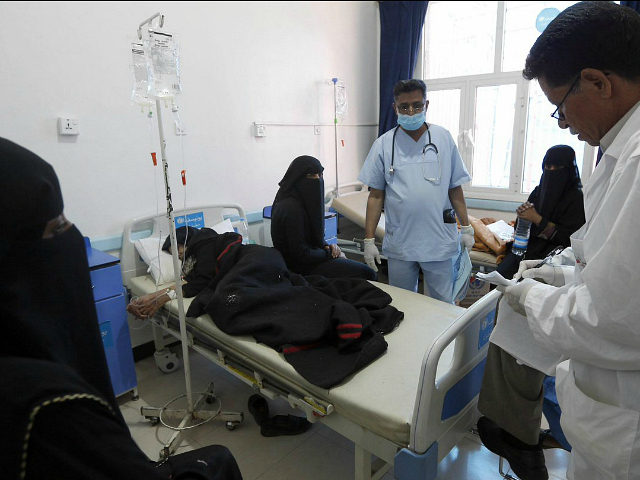War-ravaged Yemen, currently gripped by a humanitarian crisis and cholera epidemic, is spiraling towards “total” collapse as an unable or indifferent world just stands by watching, declares a high-ranking United Nations official.
In a statement to the U.N. Security Council, Stephen O’Brien, the international body’s under-secretary-general for humanitarian affairs and emergency relief coordinator, proclaimed:
The people of Yemen are being subjected to deprivation, disease, and death as the world watches. This is not an unforeseen or coincidental result of forces beyond our control. It is a direct consequence of actions of the parties and supporters of the conflict, and is also, sadly, a result of inaction – whether due to inability or indifference – by the international community.
Since March 2015, a Saudi Arabia-led Sunni coalition, backed by the United States, has been primarily fighting Iran-allied Shiite Houthis rebels in the country, allowing al-Qaeda to flourish. Regional enemies Sunni Saudi Arabia and Shiite Iran are fighting a proxy war in the Middle Eastern country, considered the Arab world’s poorest country.
O’Brien added:
Urgent action is required to stem the suffering. And yet, based on facts and – as ever – in complete candor, I return here [U.N. Security Council] to report the situation on the ground has continued to spiral downwards towards total social, economic and institutional collapse.
Yemen has the ignominy of being now the world’s largest food security crisis with more than 17 million people who are food insecure, 6.8 million of whom are one step away from famine. Crisis is not coming, it is not looming, it is here today – on our watch and ordinary people are paying the price.
The humanitarian crisis is primarily driven by a lack of access to seaports due to decisions by the U.S.-backed Saudi-led coalition and the deteriorating security situation, argued the U.N. official.
Seaports, the main entry point of commercial and humanitarian imports, are a lifeline for Yemen, which has historically been 80 to 90 percent dependent on imported food supplies.
“Time is running out. The Yemeni people face a ‘triple threat’ of armed conflict, famine, and deadly disease that has already killed, injured, displaced or otherwise affected millions and it will spare no one if it continues unchecked,” pointed out O’Brien. “The cruel irony, as I said at the beginning, is that these threats are man-made and could easily have been prevented.”
The U.N. blamed the ongoing conflict for the problems facing Yemen. People’s access to food in provinces where active fighting continues is diminishing, particularly due to high and rising prices of scarce commodities.
“What is worse the threat of famine is driven and exacerbated by conflict. Yemen is not facing a drought. If there was no conflict in Yemen, there would be no descent into famine, misery, disease and death – a famine would certainly be avoidable and averted,” O’Brien said. “We all know there will be no military solution.”
Cholera, a diarrheal disease spread by food or water tainted with human feces, is also afflicting the Yemeni people.
The disease has already killed hundreds.
While the International Federation of Red Cross and Red Crescent Societies (IFRC) places the Cholera death toll at more than 400, O’Brien said an estimated 500 have been killed.
“The health sector in Yemen is on the verge of collapse. At least 274 health facilities have been damaged or destroyed,” reports the Red Cross organization. “More than half of all health facilities in Yemen are either closed or only partially functioning. An estimated 14.8 million people now lack access to basic healthcare, including 8.8 million living in severely under-served areas, 14.5 million people lack access to clean water, sanitation and hygiene services.”
“People are dying because even basic medical treatment, that we would take for granted, is no longer available,” added O’Brien. “By the time I finish my statement to the [U.N. Security] Council today, another child in Yemen will have died from a preventable disease.”
Cholera is affecting nearly 90 percent of the country (19 out of 22 provinces). There are an estimated 52,140 suspected cases across the country, notes IFRC.
Despite the problems, the international community has only funded about 25 percent ($489 million) of the overall cost ($2.1 billion) of the humanitarian strategy and plan.
“I strongly urge that funding is provided in support of the humanitarian strategy and plan as it is the most effective, neutral and impartial way to reach those most in need,” proclaimed O’Brien.

COMMENTS
Please let us know if you're having issues with commenting.